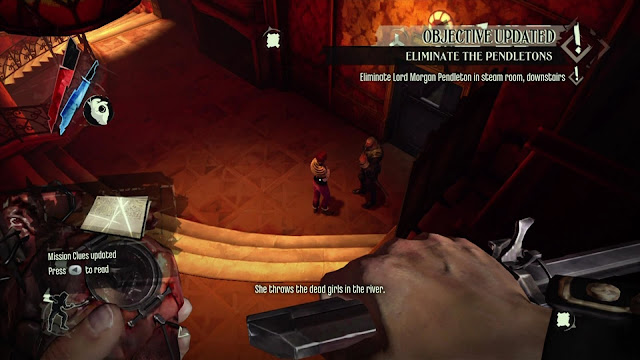Welcome to the city of Dunwall, capital of Gristol, within the Empire of the Isles. If you accidentally mistake it for England, no one would blame you. This is essentially a dark steampunk fantasy of the old empire, remixing landmarks and historical anxieties from British history into an oppressive hellscape. Dunwall feels like a twisted version of 17th-century London: palaces, mansions, factories, and slums packed tightly together in brick and iron. Smog hangs heavy in the air. Rats infest the streets.
The police monitor the population from towering watchposts, enforcing order with crackling fences of electricity. Aristocrats conspire behind closed doors while workers grumble in pubs. Dissent is brewing, and the law keeps its finger firmly on the trigger. The city is split in two by the Wrenhaven River—best admired from a distance, since the fish have a nasty habit of biting anything that dangles too close. Looming above it all are massive ships hauling whale oil, rats, and a deadly affliction known as the Rat Plague. Quarantined buildings rot from within, and bodies are stacked in open dumps.
It’s the perfect stage for a Shakespearean tale of betrayal and revenge, told through the eyes of an assassin. You step into the boots of Corvo Attano, Lord Protector to the Empress and her daughter—at least for a moment. That title won’t last. “Jack the Ripper” might be more appropriate.
Like fellow immersive sims such as Deus Ex and Thief, Arkane Studios’ Dishonored constructs its world in deliberate symbiosis with its mechanics. Progress comes from observation and exploration—finding alternate routes, hidden tools, and environmental shortcuts. In the process, you absorb the city’s culture. You overhear conversations, read correspondence, and learn enemy routines. Everything feeds into the same cohesive whole.
In essence, you can play Corvo as two different kinds of avenger: V from V for Vendetta, or Batman. Merciless or restrained. Lethal or merciful. After each mission, the game evaluates your actions on a low-to-high chaos scale. While not a novel concept, I appreciate how this system shapes moment-to-moment play and ability development rather than being reduced to a handful of narrative choices.
Open-ended games often stumble in certain areas, but Dishonored largely avoids that fate. Even its first-person melee combat—hardly revolutionary—is satisfying, particularly thanks to its parry and counter mechanics. Every encounter becomes a puzzle, with multiple viable solutions. My only real complaint is the cost of excess violence. Since killing increases chaos and darkens the world, combat is clearly intended as a last resort—unless you’re deliberately courting a grim ending.
Perhaps that price is worth paying. In Dishonored, story and mechanics are inseparable. It doesn’t pad its runtime with meaningless side quests. It’s straight to the point: eliminate or disgrace your target, loot their secrets, uncover a prisoner’s location, and move on. Apart from brief, well-placed moments of downtime, the game never overstays its welcome. Instead, it invites replay. Even on my first run, I could see multiple alternative approaches—not through quest markers, but through environmental design alone—and I’m eager to return and explore the paths I ignored.
As technological trends leave many older games behind, Dishonored endures thanks to its cohesive world and striking visual identity. It has become one of my most cherished experiences this year—eight years after its original release. It’s a shame I ignored it for so long. Perhaps the bland cover art put me off. But, to paraphrase Morrissey: the more you ignore it, the closer it gets. And ignoring Corvo Attano is a mistake that comes at a steep price.






Comments
Post a Comment